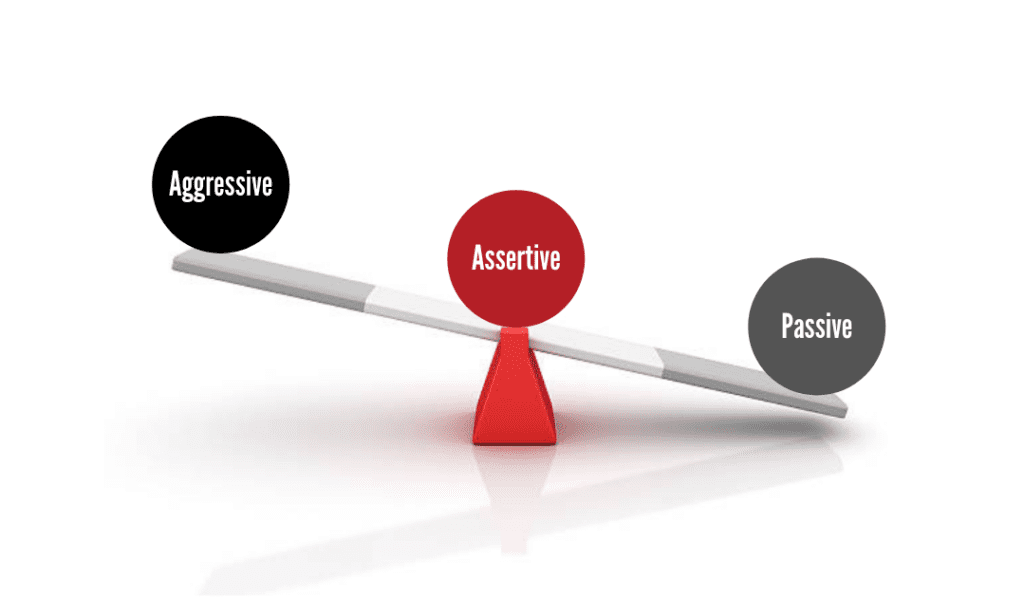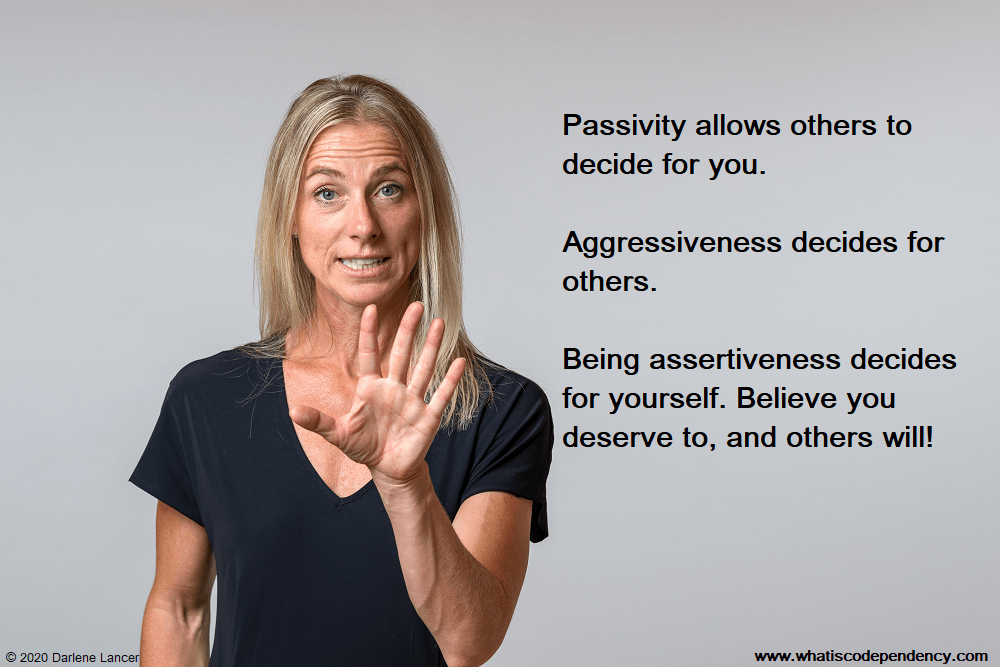In our previous article, we talked about social anxiety and how to improve your social skills so you can get back to work or out to restaurants or resume normal shopping when you are ready. Today we tackle an important communication skill–Assertiveness–that can help with anxiety, self esteem and even stress.

Imagine you are on a balance board with one end representing being passive and the other end representing being aggressive. Neither end can really help you get what you want or need. How do you strike the perfect balance. You are not so passive you are taken advantage of and manipulated. And you are not so aggressive you frighten small children ans offend everybody else? In short, how do you find that balance? How can you be assertive and still be you?
Passivity allows others to decide for you. Aggressiveness means you decide for others. Being assertive is you deciding for you. It’s finding that sweet spot in the middle, that perfect balance. Everyone at times leans toward passivity and at other times leans toward aggressiveness. Your most productive space is in the middle.
Positive Assertiveness
Positive assertiveness allows you to step up without stepping on the toes of others. People who are assertive clearly and respectfully communicate their wants, needs, positions, and boundaries to others. This is a learnable communication skill. It includes respecting the thoughts, feelings and beliefs of other people as well as your own. Increasing your assertiveness can help you both personally and professionally.
“Of course, it’s not just what you say — your message — but also how you say it that’s important. Assertive communication is direct and respectful. Being assertive gives you the best chance of successfully delivering your message. If you communicate in a way that’s too passive or too aggressive, your message may get lost because people are too busy reacting to your delivery.” Mayoclinic.org/healthy-lifestyle.
Assertive Communication is Healthy
Learning the skill of assertive communication is important. It can help you communicate more confidently. Also, it will help you deal with difficult situations. You will communicate your position in a non-aggressive way without making demands. By doing so you will be better able to negotiate a solution agreeable to all. Being able to communicate your position clearly can also help boost your self-esteem and also earn others’ respect.
“Being assertive is usually viewed as a healthier communication style. Assertiveness offers many benefits. It helps you keep people from taking advantage of you. It can also help you from acting like a bully to others.Behaving assertively can help you:
- Gain self-confidence and self-esteem
- Understand and recognize your feelings
- Earn respect from others
- Improve communication
- Create win-win situations
- Improve your decision-making skills
- Create honest relationships
- Gain more job satisfaction
- protect them from bullies and other social predators.” mayoclinic.org
“There are risks to assertive communication. Some organizational and national cultures prefer people to be passive, and may view assertive behavior as rude or even offensive. Research has also suggested that gender can have a bearing on how assertive behavior is perceived, men are more likely to be rewarded for being assertive than women.” mindtools.com.
This doesn’t mean you should not be assertive. Assertiveness is an important tool. Understanding the risks can help you maintain your confidence as you become a stronger communicator.
Assertiveness Tips
Since this is a learnable skill, the process, like all learning, is never-ending. Here are some tips to get started.
Value Yourself and Your Space
You want to be more assertive. And you want to remain true to your wants and needs. Therefore, you must understand yourself and believe in your value. Self-belief helps you recognize that you deserve to be treated with respect. What you say and do matters! Self-belief will give you the confidence to stick up for your rights and set and guard boundaries.
You Do You
Don’t make the mistake of accepting responsibility for how people react to your assertiveness. People may act angry or resentful toward you. Don’t be afraid to stand up for yourself, confront people who challenge you and/or your rights, even get angry. Remember that you can only control yourself and your own behavior. So continue to act respectful and not impose on anyone else’s needs.
Speak With Confidence
To be at your best make sure your needs and wants are met. In each situation identify what you need to achieve your goal then communicate that. If you want people to help you, asking for things in an overly aggressive or pushy way will likely alienate them. Find ways to make requests that avoid sacrificing others needs. Use “I want”, “I need” or “I feel” to convey basic assertions and get your point across firmly.
Just Say “No”
It’s ok to say “NO!” Saying no is hard to do, especially if you are used to saying yes. Assertive people are in control of themselves and are honest with themselves and others. Keep that in mind as you listen to your inner voice about your limits. Realize what you can do and want to do. Know your limits. You can’t please everyone. So saying no when you have to keeps you in control of yourself. You can try to make situations win-win. Do this by trading something, postponing or making a suggestion that works for everyone.
Keep it in Perspective
As you are trying out your new tool of assertiveness you will have setbacks. This is a new skill. Did you ride a bike perfectly the first time? Accept feedback, positive and negative, with a smile. If you don’t agree with a criticism say so but don’t get defensive or angry. That only closes doors. After you have used your assertiveness a few times, ask yourself what went well, what you can improve and what you should do differently. Recognize your wins and keep everything in perspective.

More Resources
This is a skill you can develop over time. The better you know and express yourself in a positive way the easier it will become. Learn to say no when you need to and practicing these techniques regularly. You will build up the confidence and self-belief that will help you be more assertive. I have placed an assertiveness quiz on this website. Along with it is a list of assertive phrases that will help you use assertive language in conversations.
* Please leave a comment below. You may comment anonymously or you may use your first name. We may post or quote your comment on the website. We will never post or share your last name, email address or any other personal identifying information.

Great article!
Each section describes the benefits of being assertive, the steps to becoming more assertive, and the encouragement to try even when the outcome is uncertain. I appreciate the downloadable Assertive Phrases and links to more resources, too.